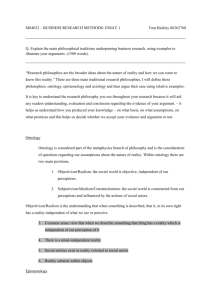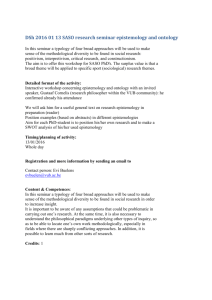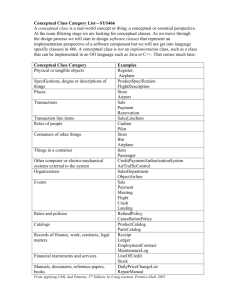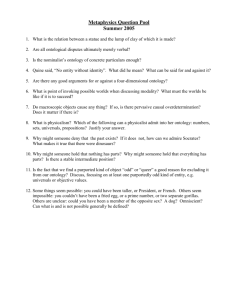Principled Pragmatics: A Guide to the Adaptation of Philosophical
advertisement
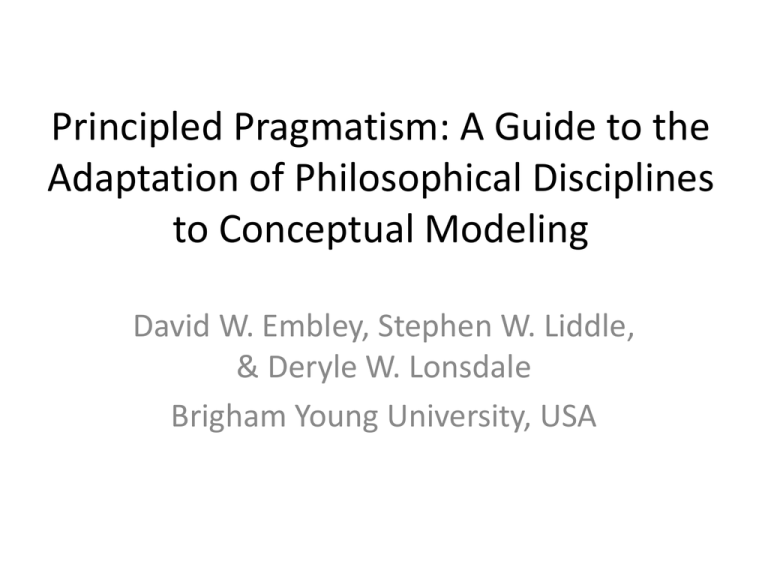
Principled Pragmatism: A Guide to the Adaptation of Philosophical Disciplines to Conceptual Modeling David W. Embley, Stephen W. Liddle, & Deryle W. Lonsdale Brigham Young University, USA Principled Pragmatism When adapting ideas from philosophical disciplines to conceptual modeling, find the right balance. Be neither too dogmatic (insisting on a discipline-purist point of view) nor too dismissive (ignoring contributions other disciplines can make). “What can be explained on fewer principles is explained needlessly by more.” - William of Ockham, 1288-1343 “I think metaphysics is good if it improves everyday life; otherwise forget it.” “The solutions all are simple … after you’ve already arrived at them. But they’re simple only when you already know what they are.” – Pirsig Principled Pragmatism (by example) • Information Extraction & Finding Facts in Historical Documents • Learning, Prediction, and Analysis & Conceptual-Modeling Languages • Information Integration & Multilingual Query Processing } } } Practical use Modeling reality Additional help Principled Pragmatism (by example) Practical • Information Extraction use & Finding Facts in Historical Documents synergistic combinations of ideas drawn from the • Learning, Prediction, and Analysis overlapping disciplines of conceptual modeling, Modeling reality ontology, epistemology, logic, and linguistics & Conceptual-Modeling Languages • Information Integration Additional help & Multilingual Query Processing } } } Information Extraction Toward a Web of Knowledge (WoK) Philosophical disciplines – What exists? (Ontology) – What facts are known? (Epistemology) – What’s implied by known facts? (Logic) – How are the facts communicated? (Linguistics) And their role in WoK development Ontology • Study of Existence asks “What exists?” • Concepts, relationships, and constraints Epistemology • The nature of knowledge asks: “What is knowledge?” and “How is knowledge acquired?” • Populated conceptual model Logic • Principles of valid inference asks: “What can be inferred?” • For us, it answers: what can be inferred (in a formal sense) from conceptualized data. Find price and mileage of red Nissans, 1990 or newer Linguistics: Communication (Turning Raw Symbols into Knowledge) • Symbols: $ 4,500 117K Nissan CD AC • Data: price($4,500) mileage(117K) make(Nissan) • Conceptualized data: – Car(C123) has Price($11,500) – Car(C123) has Make(Nissan) • Knowledge: – “Correct” facts – Provenance Linguistics: Communication (Turning Raw Symbols into Knowledge) • Symbols: $ 4,500 117K Nissan CD AC • Data: price($4,500) mileage(117K) make(Nissan) • Conceptualized data: – Car(C123) has Price($4,500) – Car(C123) has Make(Nissan) • Knowledge: – “Correct” facts – Provenance IE Actualization (with Extraction Ontologies) Find me the price and mileage of all red Nissans. I want a 1990 or newer. IE Actualization (with Extraction Ontologies) Linguistic “understanding” of query. Find me the price and mileage of all red Nissans. I want a 1990 or newer. 1990 Finding Facts in Historical Documents (A Web of Knowledge Superimposed over Historical Documents) Finding Facts in Historical Documents (A Web of Knowledge Superimposed over Historical Documents) … … … … Finding Facts in Historical Documents (A Web of Knowledge Superimposed over Historical Documents) grandchildren of Mary Ely … … … … Finding Facts in Historical Documents (A Web of Knowledge Superimposed over Historical Documents) grandchildren of Mary Ely … … … … Finding Facts in Historical Documents (Nicely illustrates the Layer Cake of the Semantic Web) Information Extraction & Fact Finding (& Principled Pragmatism: Upper/Lower Bounds) • Ontology – Ontological commitment via name in historical book – But not meta-physical existence of a person • Epistemology: – Verification via historical document display – But not a requirement of full community agreement • Logic: – Implied facts grounded in the ontology – But only computationally reasonable implied facts • Linguistics: – Communicated facts of an ontology – But not full understanding Learning, Prediction, and Analysis (Principle: model the real/abstract world the way it is.) Pastor, et al., Handbook of Conceptual Modeling Learning & Prediction Home Security (Principle: model the real/abstract world the way it is.) Learning & Prediction Home Security (Principle: model the real/abstract world the way it is.) Detection Event(x) has Detector ID(y) (t1, t2) Detection Event(x) has Timestamp(y) (t1, t2) Surveillance Controller(x) has record of Detection Event(y) (t1, t2) Surveillance Controller(x) in state Active(t1, t2) Surveillance Controller(x) transition 5 enabled(t1, t2) user abort(t1) Conceptual Modeling Languages (Principle: model the real/abstract world the way it is.) Conceptual Modeling Languages (Principle: model the real/abstract world the way it is.) @ create then enter Ready end; when Ready @ register then new thread; establishAccount; confirmRegistration; kill thread; end; when Ready @ cutCheck then new thread printCheck(Name, Amount); printEnvelope(Name, Address); kill thread; end; Conceptual Modeling Languages (Principle: model the real/abstract world the way it is.) @ create then enter Ready end; when Ready @ register then new thread; establishAccount; confirmRegistration; kill thread; end; CMP Manifesto: “Conceptual Model Programming” “The model is the code.” when Ready @ cutCheck then new thread printCheck(Name, Amount); printEnvelope(Name, Address); kill thread; end; Real-World Modeling & Principled Pragmatism • Capture the abstraction literally, • But don’t go beyond: – Neither too much like programming languages • Messages sent are sometimes not received • Transitions really do take time • Objects really can do two things at once – nor too much on meta-physical existence properties • People have intuition, but program artifacts don’t • Objects have rigidity properties, but all need not be specified Information Integration Additional help needed from philosophical disciplines Multilingual Query Processing Wie alt war Mary Ely als ihr Son William geboren wurde? (die Mary Ely die Maria Jennings Lathrops Oma ist) 이름 생년월일 사람 성별 의 자식 사망날짜 nom … Additional help needed from philosophical disciplines date de naissance individu date de décès sexe de date de baptême enfant Additional Help Needed: Examples • Ontology – Issue: ontological commitment distinguishing person, place, & thing – Solution? reliance on plausible relationships & context • Epistemology – Issue: trust – Solution? • grounding facts in source documents • evidence-based community agreement • probabilistic plausibility • Logic – Issue: tractability – Solution? detect long-running queries; interactive resolution • Linguistics – Issue: rapid construction of mappings – Solution? use of WordNet and other lexical resources Summary & Conclusion • Principles from philosophical disciplines – Can guide CM research – Can enhance CM applications • Apply principles pragmatically: – Simplicity – Sufficiency – But not overzealously BYU Data Extraction Research Group www.deg.byu.edu

